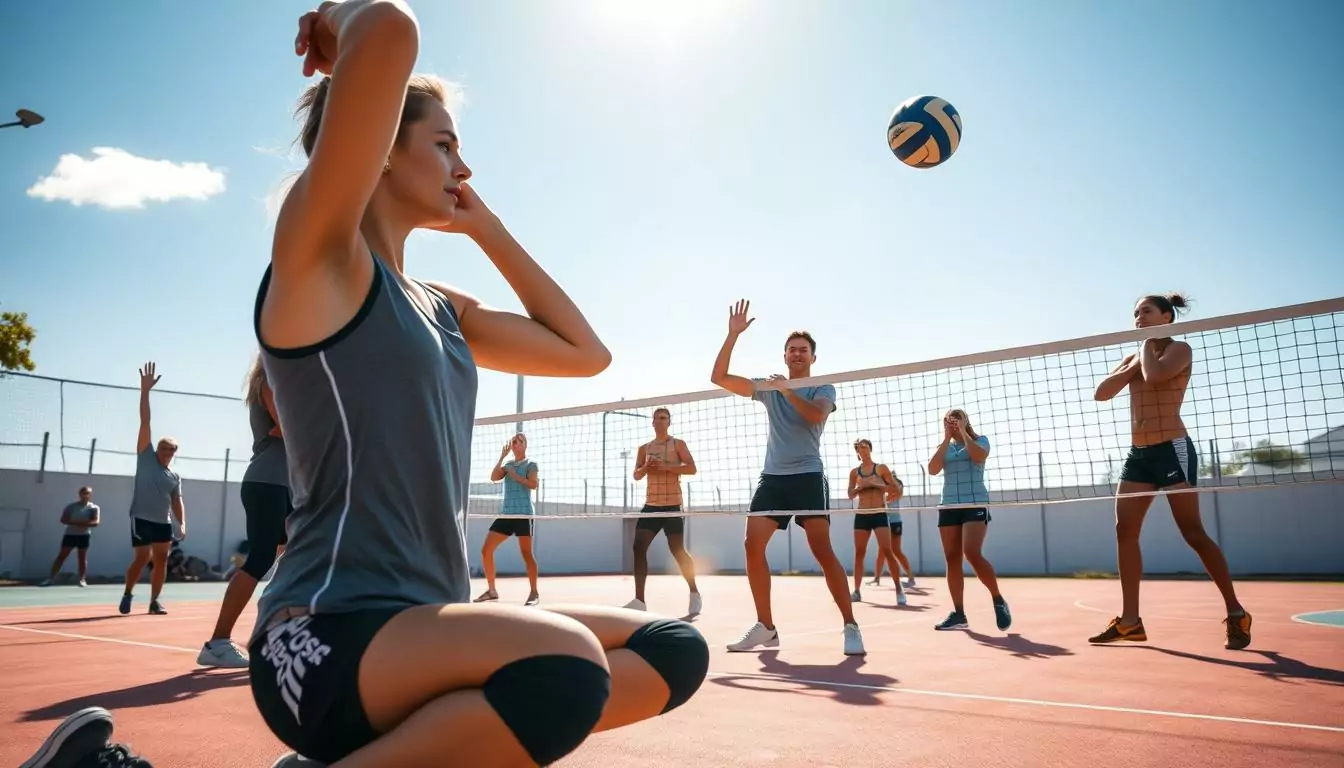In volleyball, every point matters a lot. Yet, many overlook the mental side of the game. A surprising fact is that 98% of a setter’s touches are key to winning. This shows how important mental prep is.
I’ve coached for over 20 years and seen how pre-game rituals help. They boost a player’s focus and performance. In this guide, I’ll share my best tips for mental prep in volleyball.
You’ll learn about visualization, nutrition, and more. These strategies can take your game to the next level. Get ready to unlock your full volleyball ability.
Key Takeaways
- Mental preparation is key for volleyball players, like in serve receive.
- Pre-game rituals help athletes stay focused and forget mistakes.
- Rituals can be actions, clothes, or what you eat and drink before the game.
- Visualization and positive thoughts can increase confidence and focus.
- Try new rituals and adjust them as you grow.
Understanding the Importance of Pre-Game Rituals
As a volleyball player, I’ve learned how vital pre-game rituals are. They’re not just habits or superstitions. They’re key tools to get me ready and focused before the game.
My Personal Connection to Rituals
My pre-game rituals have grown over time, shaped by college-level play. Seeing my teammates and coaches stress mental toughness, I’ve created my own routines. These include listening to a certain playlist and tying my shoelaces in a specific way.
How Rituals Impact Mental Focus
Studies show that pre-game rituals greatly affect an athlete’s focus and performance. By sticking to a routine, I can concentrate better and avoid distractions. This helps me stay calm and confident, ready to perform at my best.
Setting a Positive Mindset
My pre-game rituals also help shape my mindset. By doing things that mean a lot to me, I build a positive and focused state of mind. This mental prep is as important as physical warm-ups, helping me face the game with the right attitude.
In volleyball, where mental and physical skills are both key, pre-game rituals are essential. By understanding and personalizing these routines, I’ve improved my pre-game warmups and psychological readiness. This has led to more consistent and successful games.
My Favorite Pre-Game Rituals
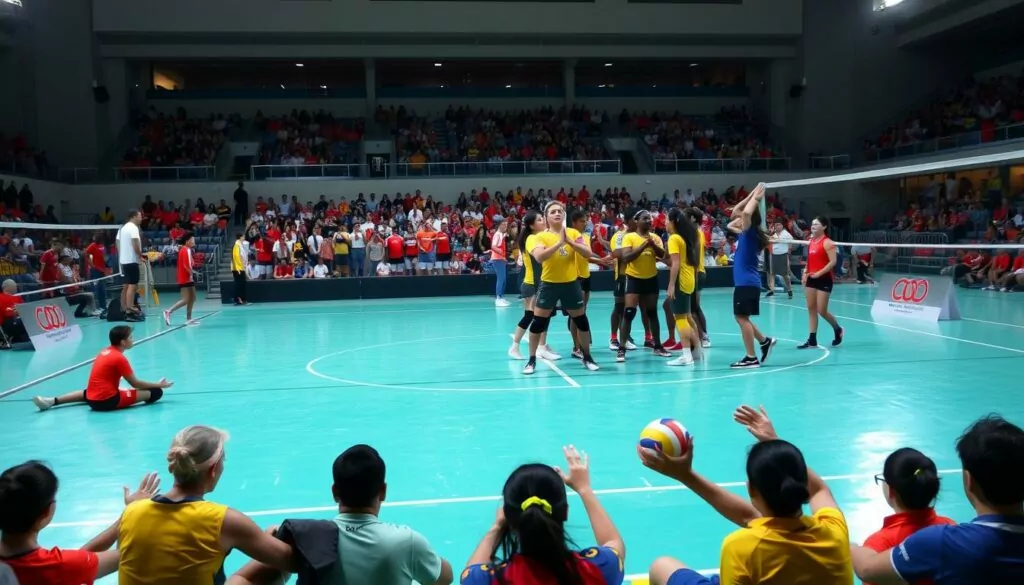
As a dedicated volleyball player, I’ve created a set of pre-game rituals. These help me get ready for the match. Stretching, listening to music, and visualization are key parts of my routine.
Stretching and Its Significance
Stretching is a must for me before the game. I start by foam rolling my major muscles. This makes my body loose and ready for the game.
It also helps me focus and get in the right mindset. Stretching is a big part of my preparation.
Listening to Music
Music is a big part of my pre-game routine. I listen to a “Pump Up” playlist on my way to the gym. Songs like “Lose Yourself” by Eminem get me pumped up and motivated.
Visualization Techniques
Visualization is another important part of my routine. I mentally rehearse each set, serve, and pass. I picture myself doing them perfectly.
This builds my confidence and focus. It helps me enter the game with a clear and positive mindset.
These pre-game rituals are not just habits. They are essential tools for my physical and mental preparation. By following these routines, I can perform at my best and give my all on the court.
The Role of Team Rituals
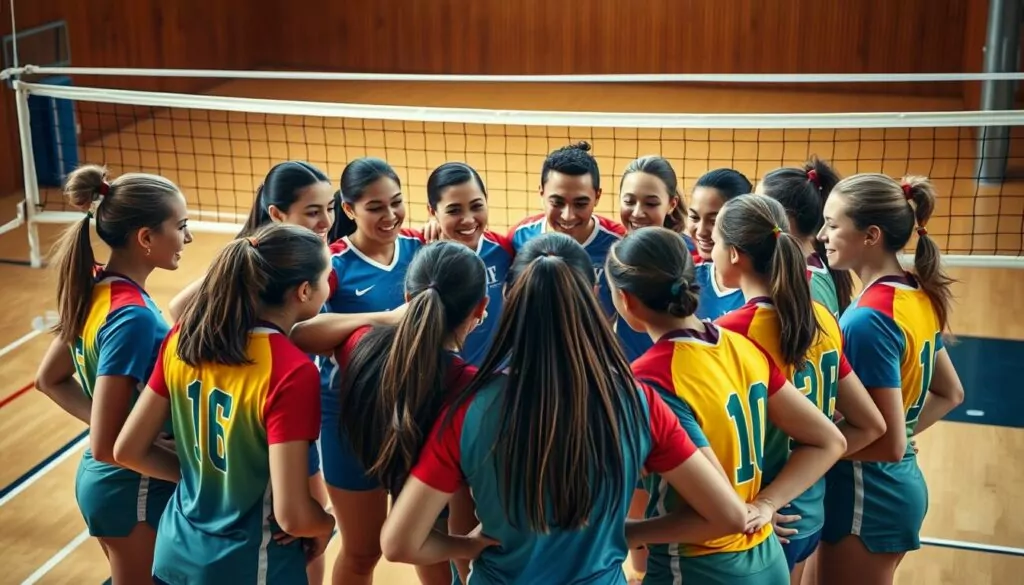
As a volleyball player, I’ve learned how team rituals help us bond and talk better. These shared practices get us ready for big games. They also make us feel united and support each other on the court.
Building Team Cohesion
Team rituals are key in bringing us together. Activities like team huddles help us share our goals for the game. Team bonding exercises, like pasta dinners before a game, help us connect personally and create a routine.
Enhancing Communication
Good team huddles and sharing rituals improve how we talk to each other. By talking about our pre-game routines, we understand each other better. This makes it easier to support each other during the game.
Sharing Personal Rituals
Sharing our personal rituals also strengthens our team. It could be a stretching routine, a favorite song, or a visualization technique. Being open about these helps us feel connected and learn from each other.
Team rituals are very important in volleyball. They help us feel united, talk better, and have a shared goal. These practices are a big part of how we prepare and work together as a team.
Creating a Consistent Routine
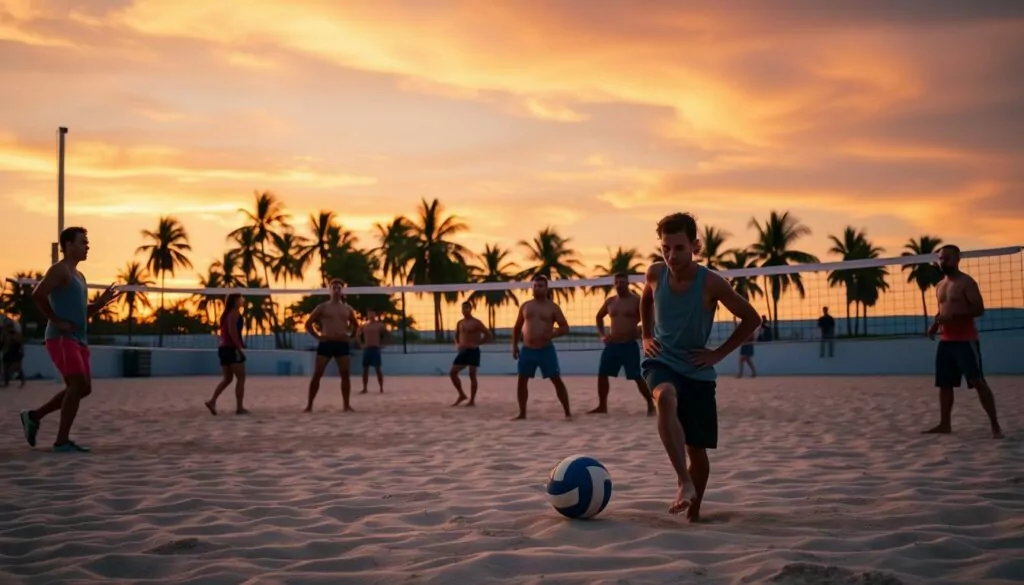
As a volleyball player, I’ve learned how important a consistent pre-game routine is. It’s not just about physical warmups. It’s also about getting my mind ready for success on the court.
Importance of Routine in Sports
Research shows that anxiety and fear can hurt athletes’ performance. Top volleyball players use routines to stay focused and calm. These routines help them perform at their best.
Finding What Works for Me
My pre-game routine is all about me. It’s changed over time to fit what works best. This might include listening to music, doing specific exercises, or eating certain foods. The key is to find what works for me and stick to it.
Adjusting Rituals as Needed
Consistency is key, but being flexible is also important. As I grow as an athlete, my routine might need to change. I might try new things or tweak what I already do. The goal is to keep my routine effective for pre-game warmups and psychological readiness.
Mental Preparation Strategies
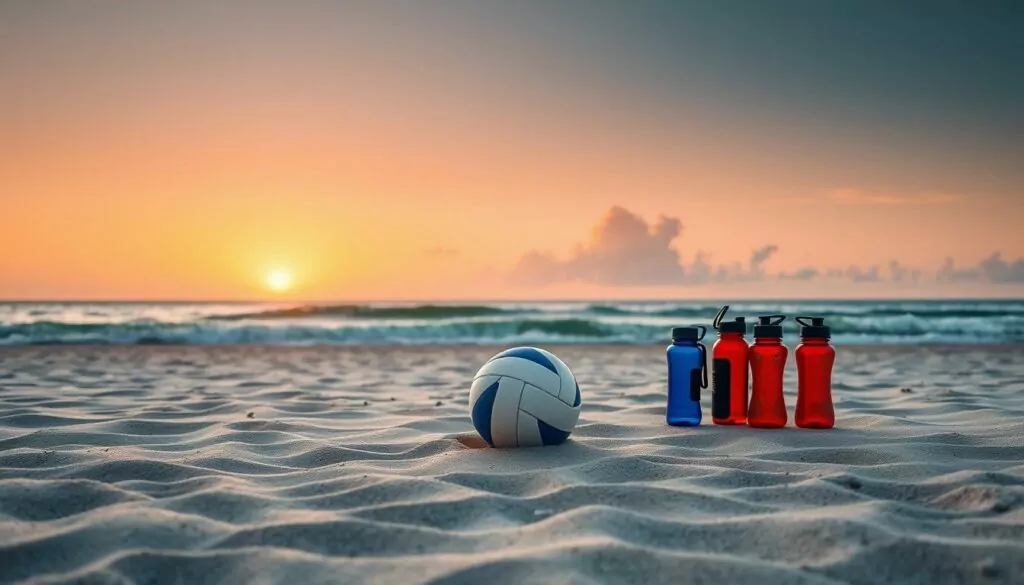
As a dedicated volleyball player, I know how key mental prep is for top performance. My pre-game rituals are more than just physical warmups and team talks. They’re a deep dive into getting my mind ready. By using different mental strategies, I’ve improved my focus, handled pre-game jitters, and set myself up for success.
Mindfulness and Breathing
Mindfulness and breathing exercises are at the heart of my mental prep. Studies show these can cut stress by 25% and boost focus by 30% during games. A few minutes of deep breathing and mindfulness help me focus and get ready mentally.
Setting Achievable Goals
Setting clear, measurable goals is another key part of my prep. Research says athletes with goals are 70% more likely to succeed and grow in their sport. Having a clear goal keeps me motivated and focused, helping me perform my best.
Journaling My Thoughts
Journaling my thoughts and feelings is also a big help. Studies show players who reflect after games grow 50% faster. Writing down my thoughts helps me understand and manage my mind, making me more ready for the game.
These mental strategies have changed the game for me. They help me face each match with better focus, confidence, and mental readiness. By mixing physical and mental prep, I’m in the best shape to reach my goals on the court.
“Consistency in pre-match routines has been linked to improved performance and increased chances of success in volleyball games.” – Kerri Walsh Jennings, three-time Olympic Gold Medalist in Beach Volleyball
Nutrition: Fueling My Body and Mind
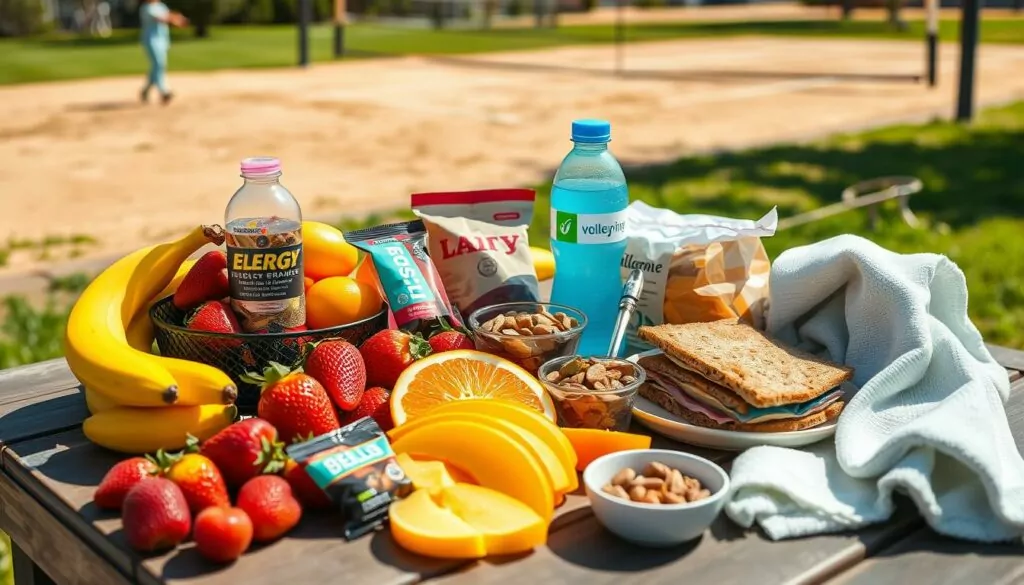
Proper nutrition is key for me before a game. As an athlete, I’ve found that what I eat affects my performance. I focus on meals, hydration, and snacks to stay energized and focused.
Pre-Game Meals I Prefer
I choose familiar, easy-to-digest foods before a game. My favorite is a cold cut combo sandwich from Subway. It has carbs, protein, and fiber for energy. I also snack on mandarin oranges an hour before to stay hydrated and keep blood sugar levels right.
Hydration Tips
Staying hydrated is essential for me. I drink water all day before a game. I also carry a water bottle during warm-ups and on the sidelines. This keeps me hydrated and focused.
Snacks That Boost Performance
- Peanut Butter & Almond Butter Filled Dates: These provide a delicious blend of healthy fats, carbohydrates, and protein to fuel my muscles and brain.
- Almond Coconut Energy Balls: A quick and portable source of complex carbs, fiber, and healthy fats to keep me energized.
- Banana Sushi or Quesadilla: Bananas offer a natural energy boost, while the whole wheat tortilla or rice paper wrap adds sustaining carbs.
- Fresh Fruit: I love snacking on berries, grapes, or apple slices to provide a natural source of carbohydrates and vitamins to support my overall health.
By focusing on balanced nutrition, I fuel my body and mind for the game. I’ve tried different meals and snacks to find what works best for me.
The Power of Visualization
As a volleyball player, I’ve found that visualization greatly impacts my game. It’s as important as my physical training. Visualization is a key tool for success on the court.
How I Visualize Success
Before every match, I mentally rehearse what’s to come. I vividly imagine perfect serves, flawless passes, and winning spikes. This mental practice boosts my confidence and gets my body ready to perform.
Crafting Effective Scenarios
I don’t just dream of winning. I visualize every step, from warm-up to the final point. This helps me prepare for the real game and develop strong pre-match strategies.
Mental Rehearsal Techniques
- I find a quiet spot to focus.
- I take deep breaths to relax and clear my mind.
- With eyes closed, I imagine myself performing well.
- I focus on my body’s sensations, the sounds, and my emotions.
- Regular mental practice has greatly improved my game.
Visualization has been a game-changer for me. It helps me improve my pre-match strategies and sets me up for success.
Dealing with Pre-Game Anxiety
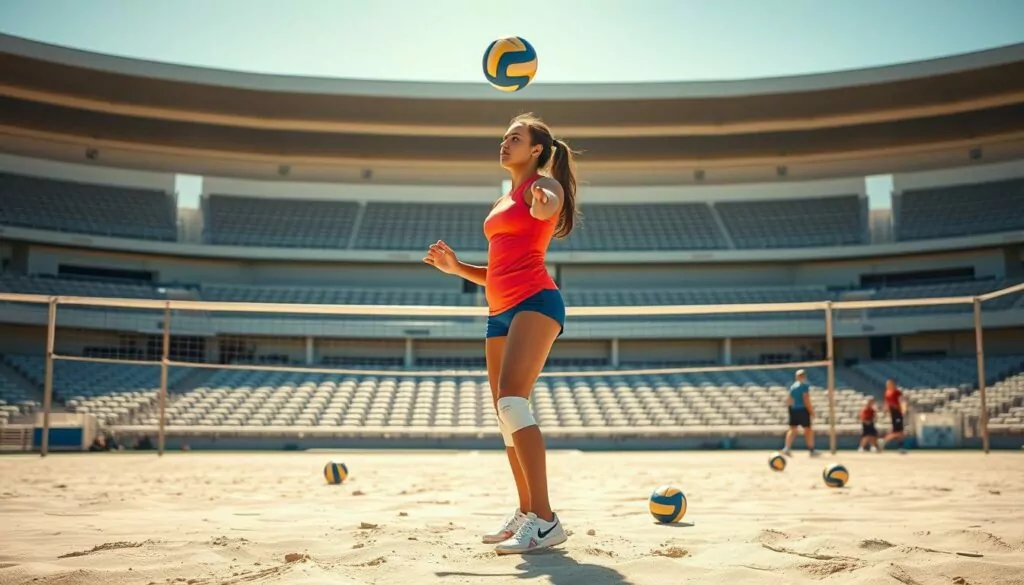
As a volleyball player, I’ve faced the challenge of pre-game anxiety. It can sneak up before the game, but I’ve found ways to handle it. The main thing is to know what makes me anxious and use strategies to stay positive.
Recognizing My Triggers
Figuring out what makes me anxious is the first step. For me, it’s the pressure to perform well or meet expectations. Knowing these triggers helps me prepare better.
Strategies to Manage Stress
- Practicing deep breathing exercises to calm my nerves between points
- Engaging in visualization techniques to picture myself succeeding on the court
- Listening to upbeat music to get me energized and focused
Positive Affirmations I Use
Positive self-talk is key to staying confident. I use affirmations like “I am in control” and “I trust my training.” These words help me stay focused and believe in myself.
“Reframing nervousness and pre-game anxiety can help players realize their excitement levels.”
Learning to see the excitement in competition is important. It helps me use my energy positively instead of letting it overwhelm me.
Exploring Superstitions
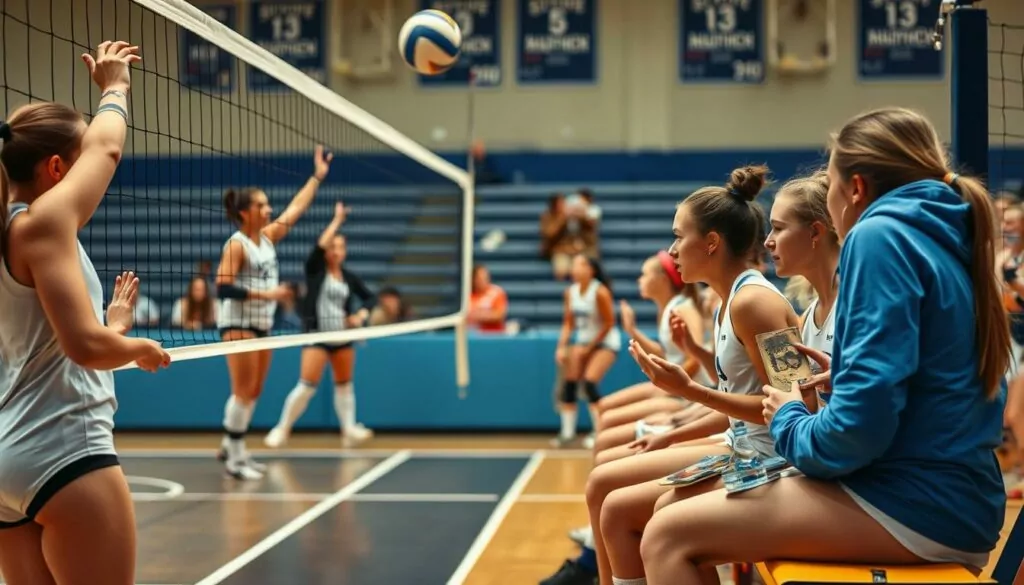
In volleyball, superstitions are as common as the game itself. Many players believe their rituals and superstitions can boost their game. Even without scientific proof, the power of these beliefs is real.
My Favorite Volleyball Superstitions
I have a few superstitions, like wearing the same socks in a tournament. My favorites include:
- Wearing a specific piece of clothing or accessory that I believe brings me luck
- Performing a certain set of stretches or warm-up exercises before each match
- Avoiding stepping on the court lines or other specific areas of the playing surface
The Science Behind Superstitions
Superstitions might seem odd, but they can really affect a player’s mindset and game. Psychologists say they can make players feel more in control and less anxious. But, they don’t actually change the game’s outcome.
How They Affect Performance
Superstitions can have both good and bad effects on athletes. A good routine can make a player feel ready and focused. But, being too strict can cause anxiety and make it hard to adapt during a game.
| Athlete | Superstition | Impact on Performance |
|---|---|---|
| Serena Williams | Wearing the same unwashed socks throughout a tournament | Increased confidence and sense of control, but could affect hygiene and comfort |
| Wade Boggs | Eating chicken, taking exactly 150 ground balls, running sprints at 7:17 PM, and writing “Chai” in the dirt before each at-bat | Helped establish a consistent routine and mental preparation, but could be bad if disrupted |
| Michael Jordan | Wearing his North Carolina basketball shorts under his Chicago Bulls uniform | Increased confidence and connection to past successes, possibly improving his game |
The role of superstitions in volleyball is complex. They can offer comfort and control but should not limit a player’s performance. It’s key to keep a balanced approach.
The Role of Warm-Up Routines
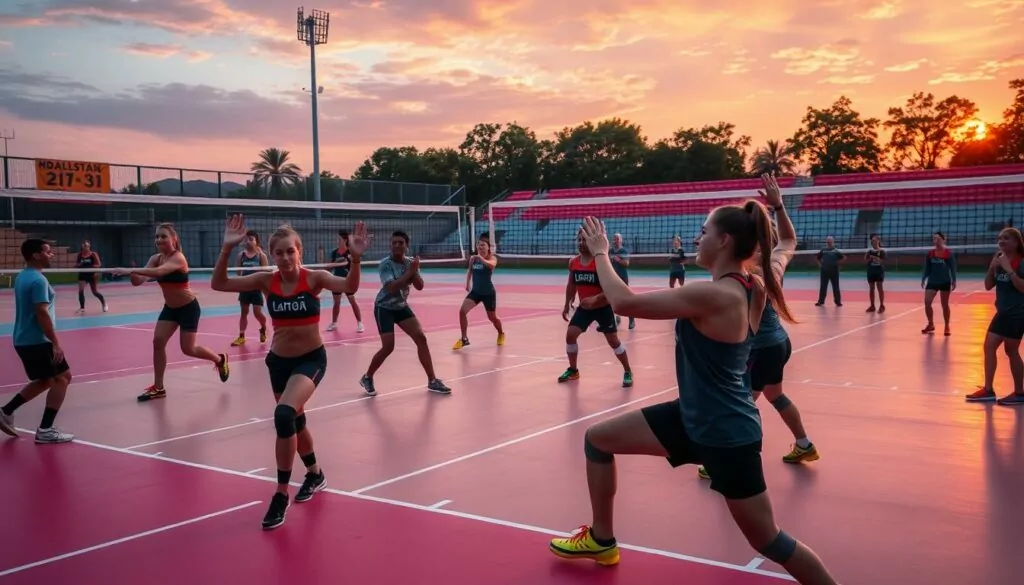
Getting ready for a volleyball game is key for me. It’s not just about being physically ready. It’s also about getting my mind right. A good warm-up routine can really boost my game.
My Go-To Warm-Up Exercises
I start with a jog or jumping jacks to get my heart going. Then, I do dynamic stretches for my muscles. This includes leg swings, arm circles, and hip rotations.
Next, I do drills that are specific to volleyball. I practice passing, setting, and short jumps. These help me feel more ready for the game.
Importance of Physical Readiness
Warming up is vital for my body’s readiness. It improves my speed, strength, and endurance. These are all important for playing well in volleyball.
By warming up slowly, I prepare my muscles and joints. This helps me avoid injuries and perform better.
Crafting a Pre-Game Playlist
I also use music to get ready. Upbeat songs get me excited and focused. Slower songs help me relax and calm down.
I keep trying new songs to find what works best. This helps me feel ready to play my best.
With a good warm-up routine, I feel ready to play my best. It’s a big part of my success on the court.
“Warming up is not just about physical readiness; it’s also a mental exercise that helps me focus and get into the right mindset.”
Engaging with Support Systems

As an athlete, I’ve learned how important my support systems are. Friends, family, and teammates all play a big role. They help me get ready for games and improve our team’s bond.
Friends and Family’s Role
My loved ones are my rock. They give me the emotional support I need to stay focused. A comforting call, a motivational talk, or just being there means a lot to me.
Their support keeps my mind positive and reminds me of what’s important. It’s not just about the game.
Team Dynamics Before a Match
Being in sync with my teammates before a game is key. It boosts our energy and helps us perform better. We share rituals, discuss plans, and support each other.
This unity is what makes us strong. It helps us reach our best on the court.
Sharing Rituals with Others
Sharing my pre-game rituals with my support systems is special. It could be a warm-up, a playlist, or a visualization. When they join in, it strengthens our bond.
This shared experience adds to the support I get. It’s a big help, both on and off the court.
In the world of sports, having a strong support system is vital. It helps me stay ready and focused. With the help of my loved ones and teammates, I face each game with confidence and unity.
Game-Day Mindset Techniques
As an athlete, I’ve learned that the right mindset is key for success. It’s not just about physical training. Mental and psychological aspects are just as important. By setting the right attitude, staying present, and building confidence, we can reach our goals.
Setting the Right Attitude
Starting a game with the right mindset is vital. I focus on being positive and present, not on past mistakes or future worries. Mental preparation is essential – I visualize success, affirm my skills, and embrace the challenge.
Focusing on the Present Moment
In the game’s heat, distractions and anxiety can overwhelm. But, staying present is the key to excellence. I tune into my senses, breathe deeply, and stay centered. This helps me respond well to the game’s flow.
Building My Confidence
Confidence is the base for outstanding performances. I use cues, positive self-talk, and success visualizations to build my confidence. When I play, I’m not just going through motions. I’m full of mental preparation and psychological readiness that drives me to excel.
The game-day mindset is a complete approach that needs practice and improvement. By setting the right attitude, staying present, and building confidence, I perform at my best. I make the most of every chance on the court.
Reflecting on Past Performances
As a volleyball player, I’ve learned that looking back at my games is key. Every match, win or loss, teaches me something new. These lessons help me improve and grow.
How My History Affects My Rituals
My past experiences shape my pre-match rituals. Some routines work well, while others don’t. By figuring out what’s effective, I can improve my game day prep.
Learning from Wins and Losses
Wins and losses both teach me valuable lessons. I think about what made me successful in wins. In losses, I focus on what I can do better, like handling pre-match anxiety or staying psychologically ready.
Adapting Rituals for Growth
I’m always open to changing my pre-game rituals. What worked before might not now. By trying new things, I find the best ways to prepare for my games.
“Meditation is me-time. It’s a chance for me to reflect on what I’ve done and what’s ahead.” – LeBron James, NBA Superstar
Finding Inspiration from Other Athletes
As I work on my pre-game rituals, I look to professional volleyball players for inspiration. Their motivational routines and game-day rituals offer new insights. They help me find strategies that fit my style and needs.
Athletes Who Inspire Me
Russ Rose, the legendary coach of Penn State University’s volleyball team, has caught my eye. With a record-breaking coaching career, he has led his team to the top. His focus on personalized training and clear goals has really spoken to me.
Rituals from the Pros
I’m intrigued by the mental preparation and positive self-talk of professional volleyball players. Athletes like those on the U.S. National Volleyball Team use affirmations and visualization. Studying these rituals has encouraged me to try new mental conditioning techniques for game day.
Adapting Their Strategies to My Style
While I admire the pre-game rituals of pros, I know what works for one may not work for me. So, I’ve been trying out different strategies. I pick the parts that fit my style and playing preferences. This way, I’ve created a pre-game ritual that boosts my performance.
“Affirmations have the power to boost execution by increasing belief in skill execution and reducing self-doubt during gameplay.”
Experimenting with New Rituals
As a volleyball player, I’ve learned the value of pre-game rituals. They help me get ready mentally and feel comfortable. But, it’s key to keep an open mind and try new things before matches.
Open-Mindedness in Pre-Game Prep
I stick to my usual pre-game routines but am always up for trying new ones. I’ve tried new stretches, visualizations, and even different meals before games. I’m always looking for what works best for me.
Trying Something Different
- Recently, I changed my pre-game music to something more energetic. It really helped me get ready for the game.
- I’ve also added a short meditation session to my routine. It helps me stay focused and calm.
Assessing What Works for Me
It’s not just about trying new things. It’s about seeing if they really help. After each game, I think about how the new rituals worked. This helps me decide what to keep and what to change.
Being open to new ideas has really improved my game. It keeps me excited and ready for each game. This approach has made my pre-game routine better and more effective.
“Experimenting with new rituals has been a game-changer for me. It’s allowed me to find what truly works best and keeps me performing at my peak.”
Conclusion: My Evolving Rituals
Reflecting on my volleyball journey, I see my rituals have changed. They’ve grown with me, adapting to new challenges. This flexibility keeps my pre-game routines effective.
Reflecting on My Journey
Looking back, my rituals have changed with my needs and experiences. What once comforted me now might distract. I’ve learned to keep an open mind and refine my routines for better performance.
The Importance of Flexibility
Flexibility in my rituals is key. Research shows elite athletes who adjust their routines perform better under pressure. Letting go of old rituals and embracing new ones keeps me empowered on the court.
Embracing the Pre-Game Process
I now see my pre-game rituals as a vital part of my preparation. Mindfully engaging with this process helps me focus for success. I’m committed to embracing the pre-game experience, improving my volleyball performance.
